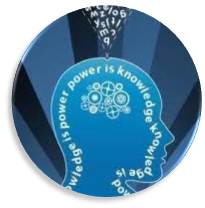As discovery systems take the Library world by storm, there is a new opportunity for user-centred information literacy programs to emerge. As library search gets easier and varied platforms become unified, the focus of information literacy on search rules and platform choice and navigation will (finally) be able to truly give way to critical thinking and imaginative exploration. These are skills and aptitudes that are needed well beyond the academic environment –making them much more meaningful and useful for many of our users.
This paper will explore how the adoption of discovery systems might impact various user groups in higher education environments – undergraduates, postgraduates, researchers, teaching faculty, etc. How will these new tools impact our users? How will our users utilize such tools? What do users need to learn to exploit these new systems effectively? As we move away from strict search rules, will creativity, serendipity and cross-disciplinarity come to library search in new and fruitful ways? How will this change the research experience?
The session will ground some of these broad questions in the experience of a medium-sized university library adopting a discovery system and rethinking its information literacy approaches. The Hong Kong Baptist University Library has a strong, curriculum- integrated information literacy program. The Library is planning to adopt and implement a discovery system in the first half of 2012, and this session will illustrate how and where the adoption of the system is changing the learning outcomes and pedagogical approaches used in our information literacy outlook, offerings, collaborations and materials.
Dianne Cmor is Head of Information Services at the Hong Kong Baptist University Library, where she and her team are responsible for developing, delivering and assessing a suite of user-oriented research and instructional services. She holds masters degrees in library and information studies and in English literature, and claims that she has no idea how she has ended up as a science liaison librarian!
Xin Li is an Information Services Librarian at the Hong Kong Baptist University Library, where she develops and delivers a variety of reference, research and instructional services. Current interests lie in exploring the learning styles of the new generation of students and adapting her teaching to best serve them. She holds masters degrees in Library and Information Studies and in Asian Studies.
RT @flexnib: Hear, hear! RT @carolgauld: vsb.li/92H8kt– library has discovery tool but teaches nested Boolean. Is that wrong? #m123
— Aaron Tay (@aarontay) June 5, 2012
@aarontay experts will always find and use their tools. Information literacy programs should focus on doing the best for the most. #m123
— Daniel Forsman (@betabib) June 4, 2012
@betabib#m123 my concern is more that Summon has gaps in the coverage of things we own. So if dumped to a database via db recommender…
— Aaron Tay (@aarontay) June 4, 2012
@aarontay there is a huge difference in how people should do and what they do. Our promoted tools should help user behavior. #m123
— Daniel Forsman (@betabib) June 4, 2012
@aarontay maybe, but do some user interviews with senior researchers on how they do their searching and that picture change. #m123
— Daniel Forsman (@betabib) June 4, 2012
that session seems to focus more on lower level undergrads. But grad and honours year need to know how to use databases no? #m123 @betabib
— Aaron Tay (@aarontay) June 4, 2012
in a one shot class in the past they focused on mechanical aspects of IL, searching & finding. now more time on evaluating #iatul2012 #m123
— Aaron Tay (@aarontay) June 4, 2012
#iatul2012 #m123 they aim to go beyond ‘how to cite’ (format) to ‘citation as communication’; uses social media connection analogy (smart!)
— Ivan Chew (@ramblinglib) June 4, 2012
#m123 example 3: citation as communication
— IATUL 2012 (@iatul2012) June 4, 2012
#m123 example 2: onesearch topic exploration #iatul2012
— IATUL 2012 (@iatul2012) June 4, 2012
#m123 example 1: reference renaissance # #iatul2012
— IATUL 2012 (@iatul2012) June 4, 2012
after summon : high level skills, explain what a book review is (facet), #iatul2012 #m123
— Aaron Tay (@aarontay) June 4, 2012
#iatul2012 they felt their problem w previous instruction to students focused only on ‘info search’ when it should be on ‘info use’ #m123
— Ivan Chew (@ramblinglib) June 4, 2012
Old before summon : select & navigate database, apply search rules, apply citation rules – not use of info #iatul2012 #m123
— Aaron Tay (@aarontay) June 4, 2012
what do we need to teach, how should we change our information literacy programme in view of Summon ? #iatul2012 #m123
— Aaron Tay (@aarontay) June 4, 2012
Hong Kong Baptist University soft launched Summon – branded One search #iatul2012 #m123
— Aaron Tay (@aarontay) June 4, 2012
#m123 thanks for these (search) tools, but no thank you #iatul2012
— IATUL 2012 (@iatul2012) June 4, 2012




Thank you for a great presentation. Could you send me your paper?
I wish we had put more effort into thinking about how discovery would effect our information literacy program while implementing Discovery. Now they have to catch up and there seems to be a difference in how fast users and staff accept/adopt discovery services.
So do we need to have information literacy programmes anymore? I can hear a loud “Yay!!” echoeing from way over at Kent Ridge. Haha! Its not going about search tools or rules, guys. So its more on the use of information. It would, thus, be focused on evaluation of sources, exploration, discernment of what students really need. Teach students content types, topic exploration (perhaps using a mindmap, looking from multi-disciplinary point). Fun times ahead!